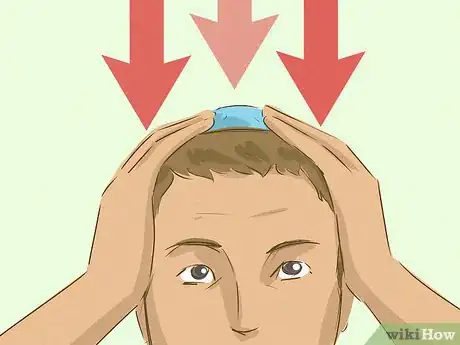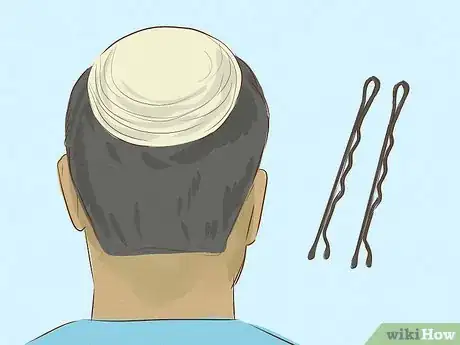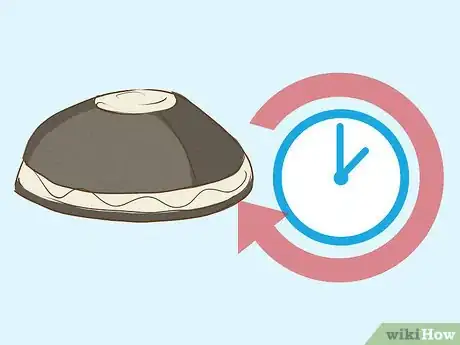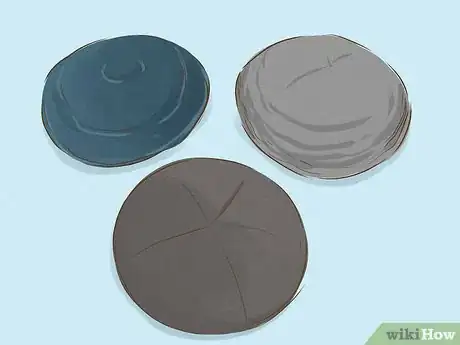This article was co-authored by wikiHow staff writer, Hunter Rising. Hunter Rising is a wikiHow Staff Writer based in Los Angeles. He has more than three years of experience writing for and working with wikiHow. Hunter holds a BFA in Entertainment Design from the University of Wisconsin - Stout and a Minor in English Writing.
There are 9 references cited in this article, which can be found at the bottom of the page.
wikiHow marks an article as reader-approved once it receives enough positive feedback. In this case, 92% of readers who voted found the article helpful, earning it our reader-approved status.
This article has been viewed 72,145 times.
Learn more...
A yarmulke, also known as a kippah in Hebrew, is a Jewish head covering traditionally worn by men that symbolizes there’s something between you and God.[1] While it’s not required by law for you to wear one, having a yarmulke on shows how observant you are of your religion. Yarmulkes come in many different designs and materials, so choose one that’s comfortable for you and wear it proudly!
Things You Should Know
- Position a yarmulke on the crown of your head and secure it to your hair with bobby pins to help it stick.
- Orthodox Jews wear them always; otherwise, wear it for synagogue, holidays, and saying blessings—and you don't have to wear it if it’s not safe to.
- A white or multicolored yarmulke is more modern, while dark colors like black, navy blue, and grey are more traditional.
Steps
Positioning the Yarmulke on Your Head
-
1Set the yarmulke on the crown of your head. Unfold your yarmulke and set it on top of your head. Make sure it covers the crown, the area near the back center of your head, completely. Don’t let your yarmulke come too far forward or cover any of your forehead.[2]
- If there’s a design on your yarmulke, make sure it’s right-side up.
-
2Press down on your yarmulke to help it stick. Once you have the yarmulke in place, press lightly down on it so the fabric contacts your hair. The fabric should catch on your hair and keep the yarmulke on your head. This helps the hold your yarmulke in place so it doesn’t move around throughout the day.[3]Advertisement
-
3Secure the yarmulke to your hair with bobby pins if it falls off. Smaller yarmulkes may slip more than larger ones. Slide a bobby pin onto one side of the yarmulke and secure some of your hair underneath it. If 1 bobby pin isn’t enough to keep your yarmulke in place, put another pin on the other side as well.[4]
- Wear bobby pins if you plan on being active, such as playing sports or exercising.
Choosing When to Wear the Yarmulke
-
1Wear your yarmulke at all times if you’re an Orthodox Jew. Although it’s not required by law, Orthodox Jews wear yarmulkes throughout the day. When you start your morning, put on your yarmulke right away. You may cover your yarmulke with another hat, such as a fedora if you’d like, but it’s not required.[5]
- You don’t have to wear your yarmulke while you’re bathing or sleeping.
-
2Put your yarmulke on during synagogue, on holidays, or when saying blessings. If you don’t want to wear your yarmulke throughout the entire day, put it on during special ceremonies or holidays. Keep it on your head whenever you attend the synagogue or recite prayers as a sign of respect for God.[6]
Tip: Fold your yarmulke in half and keep it in your pocket whenever you’re not wearing it.
-
3Don’t wear your yarmulke in public if it’s not safe to in your area. Some areas and countries aren’t safe to wear a yarmulke in public due to anti-Semitic attacks.[7] If you live in one of these areas, keep your yarmulke on at home and take it off when you go out unless you’re going to the synagogue.[8]
- Try wearing a yarmulke underneath another hat if you still want to have one on.
Picking a Yarmulke Style
-
1Pick a white or multicolored yarmulke if you follow modern Jewish practices. Many modern Jewish people choose yarmulkes that are white or have designs sewn onto them. Look for a design you like and choose a yarmulke that fits your head well. Try a suede, knit, or leather yarmulke to see what material you prefer.[9]
- Silk yarmulkes tend to denote the lowest level of observance since they’re usually given out during ceremonies if you don’t already own one.
-
2Choose a dark-colored yarmulke if you are a traditional Jew. Darker colors, such as black, navy blue, or grey, usually mean you follow more traditional Jewish practices. Pick a yarmulke that’s leather, crocheted, or suede that fits well on top of your head.[10]
-
3Pick a black velvet yarmulke if you’re a Haredi Orthodox Jew. Haredi Orthodox Jews are conservative socially, politically, and religiously and oppose secular lifestyles.[11] Look for a yarmulke that’s made of black velvet that’s about the size of a salad plate since this is the most traditional style. Make sure the yarmulke doesn’t slip or fall off your head while you wear it.[12]
- Avoid wearing a black velvet yarmulke if you don’t want to be confused as a Haredi Orthodox Jew.
-
4Wear a crocheted or wire yarmulke if you’re a woman. While women don’t need to cover their head with a yarmulke, you can choose to wear one if you want. Many yarmulkes designed for women are made with wires and beads to look feminine. Look for a design that you like and try it on to see if it fits your head well.[13]
Tip: If you don’t want to wear a yarmulke, you can also cover your head with scarves, hats, or headbands.
Community Q&A
-
QuestionDo Jewish men and women wear wedding rings?
 Community AnswerYes, if they want to, just like any other married people.
Community AnswerYes, if they want to, just like any other married people. -
QuestionWhy do Jewish men have long hair?
 Community AnswerThere is a commandment in Leviticus (19:27) against a male cutting off certain portions of hair on their head and beards. Due to concern about violating this commandment, different Orthodox groups keep their hair (typically around their temples) unusually long.
Community AnswerThere is a commandment in Leviticus (19:27) against a male cutting off certain portions of hair on their head and beards. Due to concern about violating this commandment, different Orthodox groups keep their hair (typically around their temples) unusually long. -
QuestionWhen do Christians wear a Yarmulke?
 Community AnswerThere is no religious reason for a Christian to wear a Yarmulke.
Community AnswerThere is no religious reason for a Christian to wear a Yarmulke.
Warnings
- Avoid wearing a yarmulke if you’re not Jewish since it's considered disrespectful.⧼thumbs_response⧽
References
- ↑ https://www.jewishvirtuallibrary.org/kippah-yarmulke
- ↑ https://youtu.be/9TNMrpjJA48?t=31
- ↑ https://youtu.be/9TNMrpjJA48?t=31
- ↑ https://youtu.be/9TNMrpjJA48?t=31
- ↑ https://www.chabad.org/library/article_cdo/aid/607780/jewish/What-Is-a-Kippah-Yarmulke.htm
- ↑ http://www.bbc.co.uk/religion/religions/judaism/customs/yarmulke.shtml
- ↑ https://www.jta.org/2018/04/25/global/will-europes-jews-stop-wearing-kippahs-already
- ↑ https://www.ou.org/life/inspiration/wear-your-yarmulke-because-you-can-and-its-good-for-you/
- ↑ https://www.myjewishlearning.com/article/ask-the-expert-which-kippah-should-i-wear/
- ↑ https://www.myjewishlearning.com/article/ask-the-expert-which-kippah-should-i-wear/
- ↑ https://www.myjewishlearning.com/article/haredim-charedim/
- ↑ https://www.myjewishlearning.com/article/ask-the-expert-which-kippah-should-i-wear/
- ↑ https://www.myjewishlearning.com/article/ask-the-expert-why-dont-women-wear-kippot/







































































